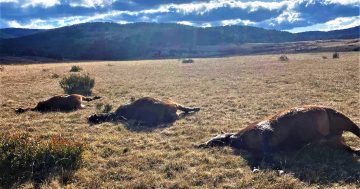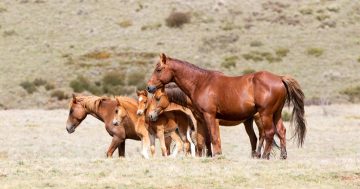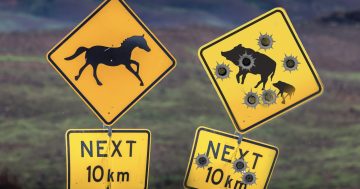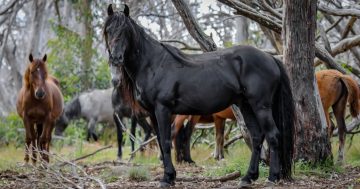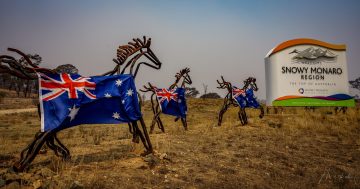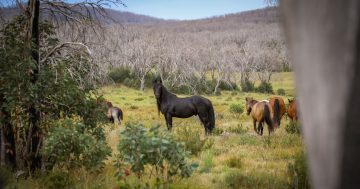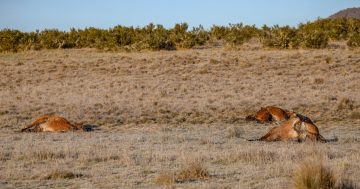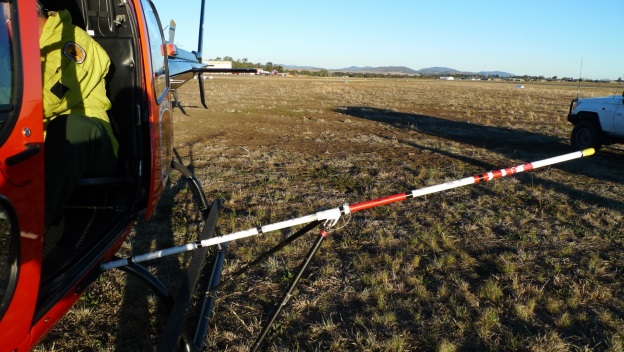
The Spring 2020 survey on the wild horse population was carried out in four survey blocks within Kosciuszko National Park in October and November 2020. Photo: NSW Office of Environment and Heritage.
The release of the final report on a Spring 2020 survey of wild horses in Kosciuszko National Park has done little to subdue the squabble over how these contentious steeds should be managed.
Conservation groups are viewing the news as a green light to additional culling of the wild horses, while pro-brumby supporters and local landholders say the horse population has already reached sustainable levels.
The hard-fought recount of the wild horses has revealed a population drop of around 5000 since 2019, with results showing just more than 14,000 brumbies currently call Kosciuszko National Park home.
The new data comes after NSW Deputy Premier John Barilaro pleaded repeatedly, in 2020, with NSW Minister for Energy and Environment Matt Kean for an urgent survey of the horses in the national park following the prolonged drought and unprecedented bushfire season.
The minister finally conceded in August, with the aerial survey completed by University of New England-based firm GE and SC Cairns Consulting in October and November 2020.
“The results of this survey show we were justified in our push for an urgent recount of the wild horses in the park,” said Mr Barilaro. “Results from the 2019 survey – that there were 19,000 horses in Kosciuszko National Park – were simply not reflective of what the community knew to be true.”
He said he is pleased to be finally dealing in facts, and the NSW Government can get on with finding the right balance between recognising the cultural and heritage significance of the iconic brumby and managing their environmental impact.
Mr Barilaro said he accepted the figure of 14,000 wild horses in the park is still too high, and that active management of their impact on the park’s alpine environment must continue.
“The NSW Government has always said we will remove brumbies from the park, and this is already being done using passive trapping and rehoming methods, and perhaps down the track with fertility control methods,” he said.
“I also understand that some won’t accept this figure of just over 14,000 wild horses in the park. I appreciate your concerns, but I’ve been assured these survey results are based on the world’s best practice and have been independently peer reviewed by the CSIRO and the Queensland Department of Agriculture.”
Mr Barilaro has also been forced to refute claims he has backed away from supporting the wild horses.
“Let me make this clear: I delivered the legislation that recognises our beautiful brumbies, no-one else did, and I’ve been hammered by both sides of the debate for years over it,” he said.
“Do not always believe the headlines. I’ve always maintained we need to find a balance for the brumbies and the environment, and I have always accepted that current numbers are high – as have many pro-brumby supporters – but we must find a humane way of managing this.”
Mr Barilaro also said he never agreed to 600 being the target number.
“Actually, quite the opposite,” he said. “The numbers I believe are sustainable in Kosciuszko National Park have always been around the 3000-4000 mark. That has not, and will not, change.”
The survey results will inform a new draft wild horse management plan expected to go on public exhibition in the first half of 2021.
The plan will also take into account advice provided by the community and scientific advisory panels in spelling out how horse populations could be controlled down to sustainable levels, while protecting the environment and recognising the wild brumby’s heritage value.
In 2020, more than 340 horses were removed from the park by passive trapping and rehoming. This interim program focusing on Nungar Plain, Cooleman Plain and Kiandra Plain will continue pending the finalisation of the new management plan.
Wild horse advocate Peter Cochran said he doesn’t accept that 14,000 horses are in Kosciuszko National Park and supports calls for an independent count.
“There are no horses in fragile alpine ecosystems – there are no horses in 90 per cent of Kosciuszko National Park,” he said. “The only area not burned on Kosciuszko National Park in 2020 was the area of greatest concentration of horses.”
Mr Cochran joins local landholders in suggesting the existing wild horse population is sustainable.
Reclaim Kosci conservation officer Candice Bartlett views Mr Barilaro’s comments as a change of heart, saying they echo the sentiments of the widely supported draft plan proposed in 2016 by former environment minister Mark Speakman.
“It was in June 2018 that Mr Barilaro pushed through the horse protection law, dumping the 2016 plan and overriding national park legislation,” she said. “He said his approach would see a reduction of horses in the park and protect sensitive areas.
“Every year we wait to see the scale of the problem grow and the damage to the park increase. Now that Mr Barilaro supports a science-based horse management plan, Reclaim Kosci looks forward to working constructively with the NSW Government on the rapid implementation of a new plan.”
Original Article published by Edwina Mason on About Regional.












